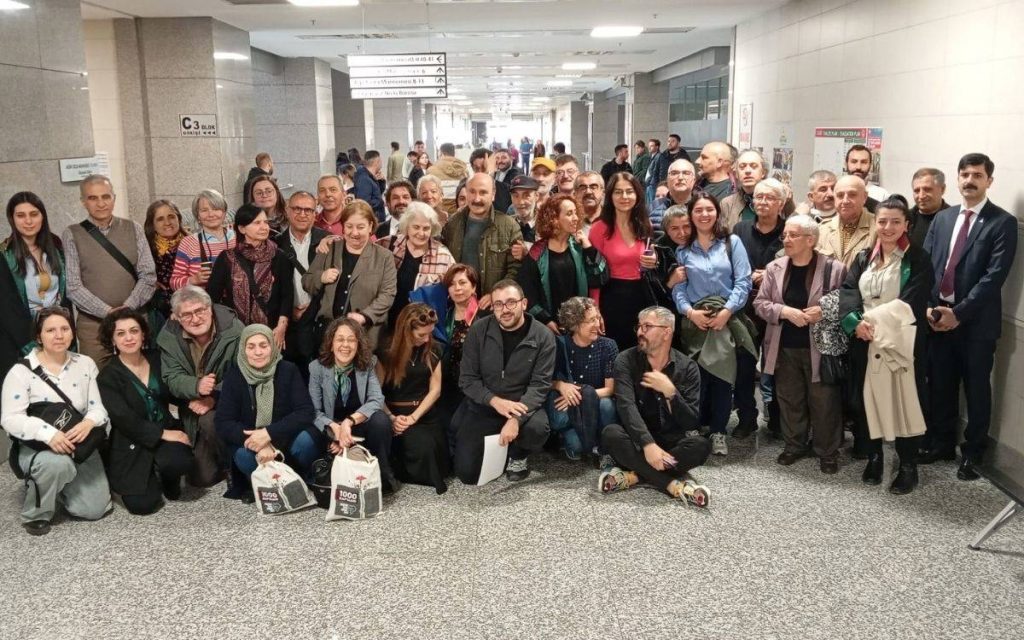The İstanbul 21st Penal Court of First Instance has acquitted 46 defendants who were detained during the Saturday Mothers/People’s 700th-week gathering in 2018, a significant event commemorating relatives of disappeared persons and advocating for their rights. The court ruled that the legal elements of the alleged offenses were not satisfied, thereby rejecting various charges brought against the defendants. This ruling comes amid a backdrop of persistent restrictions on demonstrations by the Saturday Mothers, shedding light on the ongoing struggle for human rights and justice in Turkey.
| Article Subheadings |
|---|
| 1) Key Developments in the Court Ruling |
| 2) Context and Background of the Saturday Mothers |
| 3) Attendees Recount Events of the 700th Gathering |
| 4) Human Rights Advocacy and Legal Precedent |
| 5) Implications for Future Demonstrations |
Key Developments in the Court Ruling
The İstanbul 21st Penal Court, in a landmark decision, acquitted all 46 individuals charged with participating in unlawful gatherings during the Saturday Mothers/People’s 700th-week event. The court found that the prosecution failed to substantiate the claims of unlawful assembly and refusal to disperse, leading to a dismissal of all charges. The court’s decision reflects a growing recognition of individuals’ rights to assemble peacefully, particularly in the context of human rights advocacy. In addition to acquitting the defendants, the court rejected a request from the prosecutor to file criminal complaints related to alleged police injuries during the intervention, indicating that it was unlikely to pursue charges further unless evidentiary needs arose.
Context and Background of the Saturday Mothers
The Saturday Mothers/People, a group formed in 1995, emerged from the need to seek justice for individuals who disappeared during Turkey’s troubled political past. Their initial gathering was in Galatasaray Square, motivated by the discovery of the body of Hasan Ocak, a victim of enforced disappearance. The Saturday Mothers gathered regularly in a silent protest to demand accountability from the state and remember their loved ones. Over the years, they faced significant repression and violence from authorities enforcing laws that curtail public protests. This has culminated in a long history of struggles, legal battles, and public advocacy against state-sponsored violence and human rights violations.
Attendees Recount Events of the 700th Gathering
The gathering on August 25, 2018, marking the 700th week of protests, was met with aggressive police action. Participants, many of whom were relatives of the disappeared, reported experiencing heavy police violence even before the event commenced. Witness accounts describe aggressive tactics including the use of rubber bullets and tear gas against peaceful demonstrators. Gülseren Yoleri, the President of the İstanbul Branch of the Human Rights Association, highlighted that the assembly had been banned arbitrarily, suggesting governmental knowledge of these actions by high-level officials, including the Interior Minister. Following this violent crackdown, participants were detained; however, most were released later in the day after providing statements.
Human Rights Advocacy and Legal Precedent
Human rights advocates, including representatives from the Human Rights Association, have persistently challenged the legal and political framework surrounding these protests. Legal proceedings against the 46 individuals had been mired in controversy, which emphasized the societal and legal injustices experienced by those attending these gatherings. In 2022 and 2023, the Turkish Constitutional Court issued rulings acknowledging the police’s actions against the Saturday Mothers as violations of their rights. Despite these rulings, the lawyers and human rights defenders assert that the state continues to ignore its constitutional obligations, thereby severely undermining the freedoms of assembly and expression.
Implications for Future Demonstrations
The acquittal of the 46 defendants sends a strong message concerning the rights to peaceful assembly and the need for state accountability. This ruling may embolden further gatherings and protests, but it does not erase the extensive history of repression faced by the Saturday Mothers and other civil rights movements in Turkey. The ongoing narrative suggests that while legal victories occur, the struggle for justice and recognition of human rights remains fraught with challenges. Advocates remain cautious but hopeful that this ruling may catalyze a broader acceptance of human rights practices within Turkey’s political framework.
| No. | Key Points |
|---|---|
| 1 | The İstanbul court acquitted 46 individuals detained during the Saturday Mothers’ 700th-week protest. |
| 2 | The court found that the legal criteria for alleged offenses were not met. |
| 3 | Participants reported substantial police violence during the August 2018 gathering. |
| 4 | The Saturday Mothers have faced ongoing restrictions and oppression since their inception in 1995. |
| 5 | The ruling may open doors for further advocacy and demonstrations in the future. |
Summary
The acquittal of the 46 defendants in the İstanbul court represents a pivotal moment for human rights advocacy within Turkey. It underscores the ongoing efforts of the Saturday Mothers and similar organizations in seeking justice not solely for their loved ones but for broader civil rights in the country. As the legal landscape continues to evolve, this case may influence future gatherings and broader public discourse surrounding state accountability and human rights practices.
Frequently Asked Questions
Question: Who are the Saturday Mothers/People?
The Saturday Mothers/People are a human rights group formed in 1995, dedicated to seeking justice for individuals who disappeared while in state custody in Turkey.
Question: What was the significance of the 700th-week gathering?
The 700th-week gathering marked a significant milestone for the Saturday Mothers, highlighting their persistent efforts and struggles against enforced disappearances and state violence.
Question: What were the outcomes of the court’s decision?
The court acquitted all 46 defendants who were charged, establishing a legal precedent for the rights to peaceful assembly and raising awareness about the ongoing human rights issues in Turkey.


